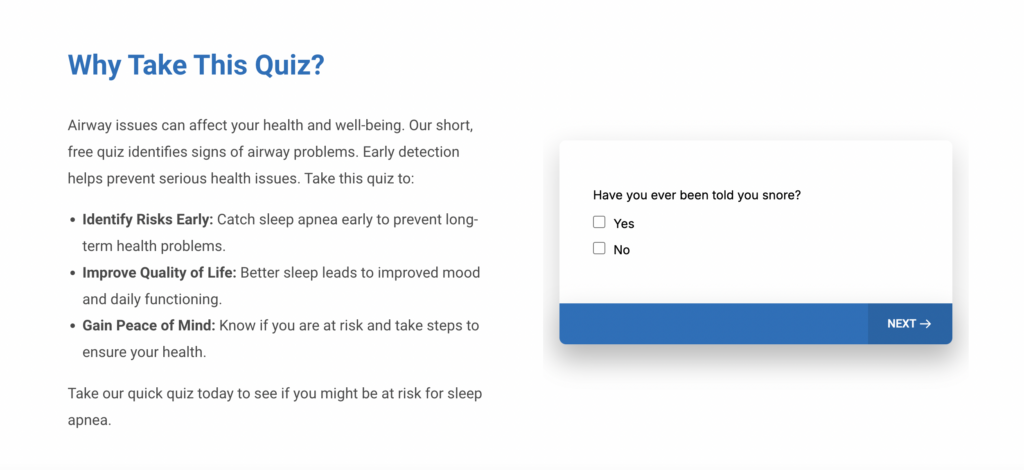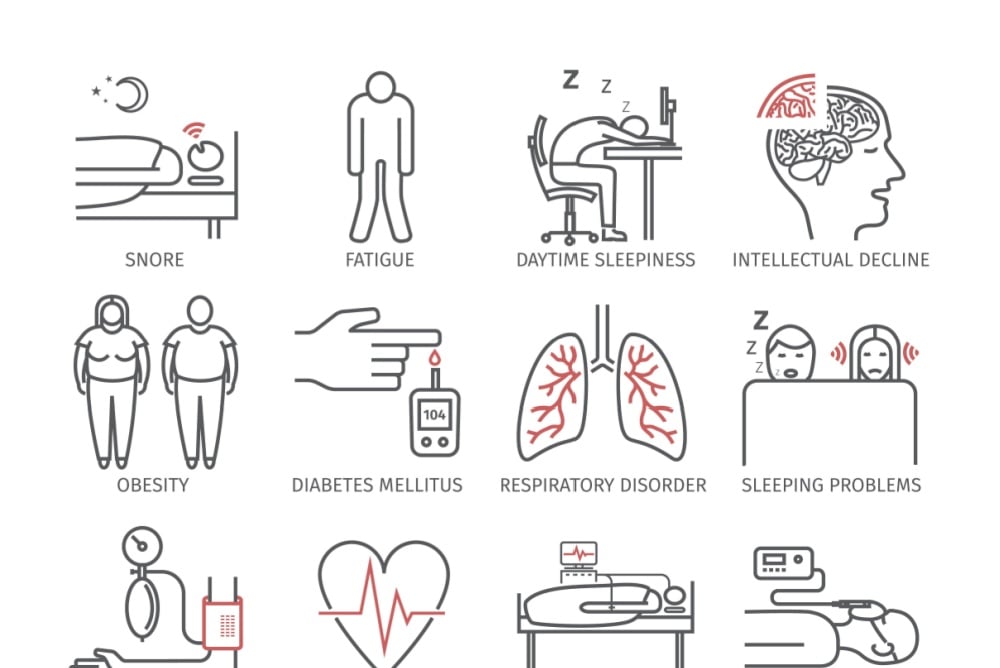Do some mornings feel like you’re dragging yourself out of bed, no matter how long you’ve slept? Are you reaching for that second, third, or even fourth cup of coffee just to stay awake? Maybe you’re so worn out that you fall asleep the minute your head hits the pillow at night.
It’s easy to dismiss these signs as just part of getting older or being stressed out. But what if there’s something more going on—something like sleep apnea?
Sleep apnea causes your breathing to stop and start repeatedly throughout the night without you even realizing it. You might wake up hundreds of times and not remember a single one. This constant disruption ruins the quality of your sleep, leaving you feeling like a zombie during the day. If left untreated, sleep apnea can take a serious toll on your health.
Curious is You’re at Risk? Take Our Quiz and find out!

Recognizing the Symptoms of Sleep Apnea
Identifying the signs of sleep apnea is the first step toward getting the help you need. While it’s easy to overlook some symptoms, they can have a significant impact on your daily life. Below, we’ll explore the common signs to watch for, so you can better understand how this condition might be affecting your sleep and overall well-being.
Excessive Daytime Sleepiness
Do you find yourself struggling to stay awake during the day, no matter how long you think you slept? Are you nodding off during meetings, while watching TV, or even worse, while driving? This overwhelming daytime drowsiness is a hallmark sign of sleep apnea.
When your sleep is constantly interrupted by breathing pauses, your body becomes severely sleep-deprived. No matter how long you were technically “asleep,” you’ll still feel exhausted. If you rely heavily on naps, caffeine, or energy drinks just to get through the day, it’s a red flag. You can take a simple quiz like the Epworth Sleepiness Scale or our free sleep quiz to measure your daytime sleepiness. Here’s what to look out for:
Morning Headaches
Waking up with a pounding headache or that foggy, disoriented feeling? These can be signs of sleep apnea. When your oxygen levels drop repeatedly during the night, it messes with the blood flow to your brain, leading to those awful morning headaches or the dreaded “brain fog.”
Pay attention to how you feel when you wake up. If you’re consistently battling morning headaches after a full night’s sleep, it might be time to consider whether sleep apnea is the culprit.
Irritability and Mood Changes
Sleep deprivation can wreak havoc on your mental and emotional health. Many adults with undiagnosed sleep apnea notice they’re more irritable, anxious, or even depressed.
When your sleep is fragmented, your brain can’t go through the full sleep cycles it needs to recharge.
On top of that, low oxygen levels can cause chemical changes that affect your mood, leaving you feeling on edge. If you’re finding yourself more impatient, lonely, or sad without any clear reason, sleep apnea could be impacting your mental health. Talk to Dr. Cribbs about any emotional changes to pinpoint the potential cause.
Nocturia and Frequent Nighttime Urination
Nocturia, or excessive nighttime urination, is common as we age, but if you’re constantly getting up to pee multiple times a night, it could be linked to sleep apnea.
Here’s why: the drops in oxygen caused by sleep apnea trigger the release of certain hormones that make you urinate more frequently. Plus, the poor sleep quality makes you more aware of the urge to go. If you’re waking up several times a night to use the bathroom, track how often it happens and share that information with Dr. Cribbs to help identify any underlying issues.
Decreased Libido and Impotence
If you’ve noticed a sudden drop in your sex drive or are struggling with erectile dysfunction, sleep apnea could be a factor.
Studies show that up to 91.3% of men with erectile dysfunction also have sleep apnea. The lack of oxygen and disrupted sleep interferes with hormone regulation, making it harder to achieve and maintain an erection. Any significant change in your libido or sexual function is worth discussing with Dr. Cribbs, as it might be tied to a sleep disorder.
Dry Mouth and Sore Throat in the Morning
Waking up with a dry mouth or sore throat could be a sign that you’re struggling to breathe at night. When your airway is obstructed, you may sleep with your mouth open, leading to that “cotton mouth” feeling in the morning. The snoring and gasping for air can also strain your throat muscles, leaving it raw and sore.
If you frequently wake up with a dry mouth or sore throat, especially in the morning, make sure to mention it to Dr. Cribbs during your consultation.
Night Sweats
Waking up drenched in sweat can be another sign of sleep apnea. These night sweats are often a reaction to the adrenaline your body releases when it’s stressed from not getting enough oxygen.
This hormonal response can mess with your body’s temperature regulation, leading to hot flashes and sweating. If you’re waking up in a sweat more often than not, it’s worth discussing with Dr. Cribbs to see if sleep apnea could be the cause.
High Blood Pressure
Multiple studies have shown that sleep apnea significantly raises your risk of developing high blood pressure. Each time you stop breathing during sleep, your blood oxygen drops and your blood pressure spikes.
Over time, this constant stress on your cardiovascular system can lead to chronic high blood pressure, increasing your risk of heart attack and stroke. If your blood pressure is hard to control despite medication and lifestyle changes, it’s a good idea to ask Dr. Cribbs about being evaluated for sleep apnea. Treating it could help get your blood pressure back on track.
Gasping or Choking While Sleeping
This is one of the most alarming signs of sleep apnea—and often the one that finally prompts people to seek help. If your partner notices that you’re gasping or choking in your sleep, it’s likely your body’s way of waking you up so you can start breathing again.
This symptom tends to worsen as sleep apnea progresses, so don’t ignore it. If you or your partner notice this happening, it’s important to talk to Dr. Cribbs right away to get tested for sleep apnea. Once diagnosed, treatment can prevent these dangerous interruptions in breathing.

Other Common Signs Include:
- Mouth breathing while awake or asleep
- Bedwetting and nightmares
- ADD/ADHD
- Teeth grinding
- Crowded, misaligned teeth
- Snoring or making noises while sleeping
- Allergies and asthma
- Dark under-eye circles
- Aggression and irritability
- Poor concentration and academic performance
- Depression
The sooner you can identify these signs by taking a sleep apnea test, the faster you can start getting the relief and healing you need.
What are some treatments for sleep apnea
The Vivos Method, The Myobrace System and Myofunctional Therapy are some of the best treatments available. These are CPAP alternative treatments.
Take Action Now!
At TLC Dental Care, we know you want to wake up feeling refreshed, energized, and ready to take on the day.
To make that happen, you need peaceful sleep that lasts through the night, with easy, uninterrupted breathing.
The problem is that sleep apnea is disrupting your sleep, causing you to snore and gasp for air all night long. Your airflow gets cut off, leaving you groggy no matter how long you were “asleep.”
Here’s how Dr. Terrie Cribbs can help with our sleep apnea treatment:
- First, we’ll dive deep into your sleep history and symptoms.
- Then, we’ll create a custom treatment plan that may include oral appliances, breathing exercises, and advanced CPAP alternatives.
- Finally, we’ll support you every step of the way, guiding you back to clear airways, solid sleep, and mornings where you wake up bright-eyed and ready for the day.
So, don’t wait any longer—schedule a consultation today with Dr. Terrie Cribbs, your sleep apnea specialist at TLC Dental Care.
And while you’re at it, visit our website to learn more about how sleep apnea might be affecting you.
Schedule your FREE consultation today!
TLC Dental Care
1547 Downtown W Blvd,
Knoxville, TN 37919
Driving Directions
Curious if You’re at Risk? Take Our Quiz and find out!

About The Author
Dr. Terrie Cribbs, Dentist in Knoxville, TN
Dr. Terrie Cribbs is a trusted and friendly dentist proudly serving the Knoxville, Tennessee community. After earning her Doctor of Dental Surgery degree from The University of Tennessee College of Dentistry in Memphis, Dr. Cribbs returned to Knoxville to fulfill her lifelong passion for dentistry. Inspired by her father, a dentist, and her mother, a lab technician, she brings a strong foundation in science, healthcare, and patient-centered care to her practice.
With years of experience and a deep commitment to continuing education, Dr. Cribbs provides comprehensive dental services with a focus on preventive care, patient education, and overall wellness. She believes in building lasting relationships and creating positive dental experiences for patients of all ages.
When she’s not caring for smiles in Knoxville, Dr. Cribbs enjoys art, quilting, painting, gardening, and exploring East Tennessee’s beautiful national parks with her husband. Her dedication to both dentistry and her community has made her a go-to dentist in Knoxville for families seeking compassionate, expert oral health care.
